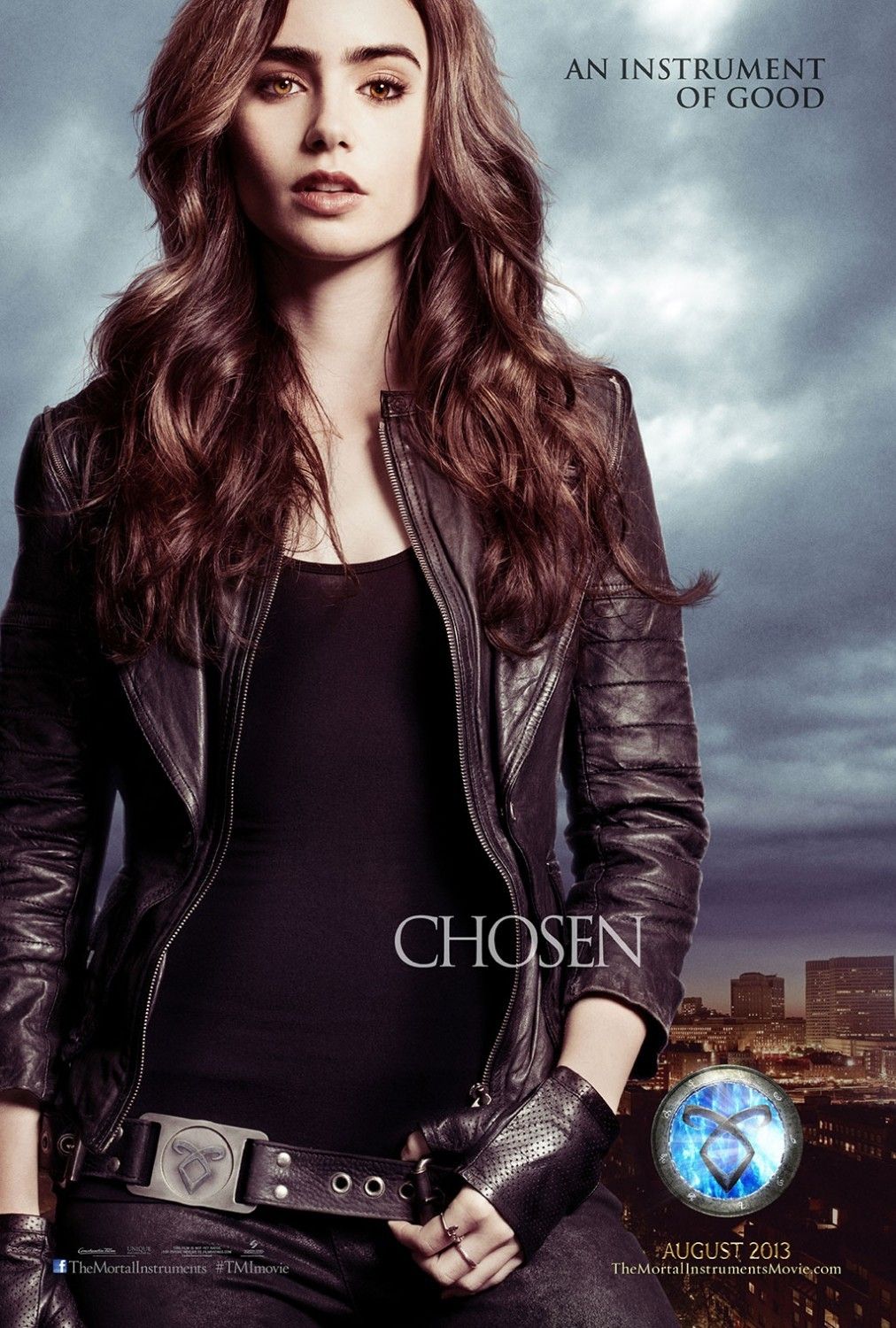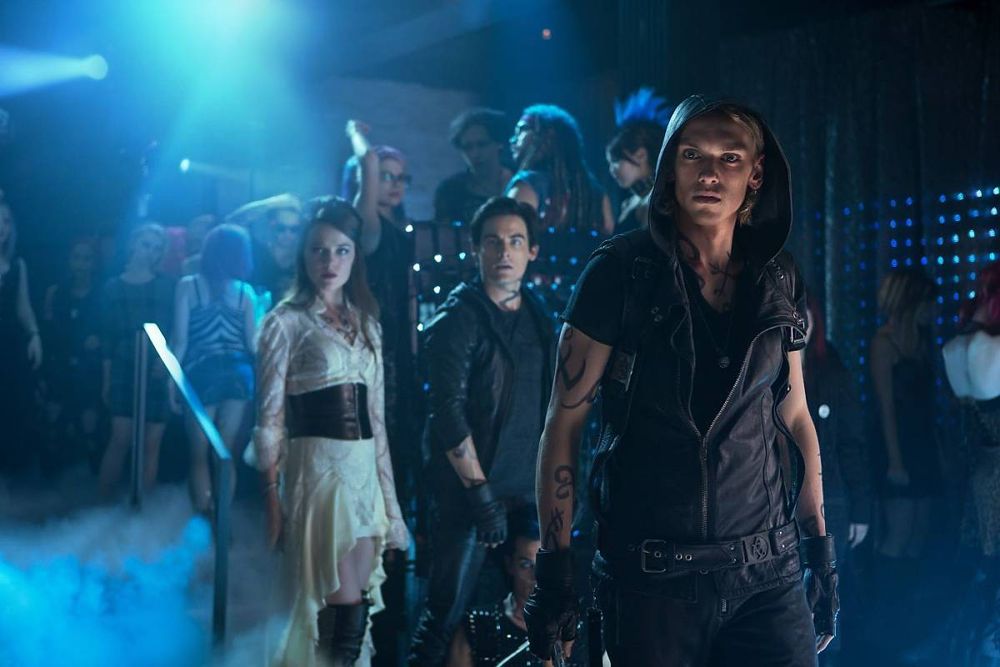Although the fantasy landscape of Comic-Con International would seem to allow anyone to be anything they want, the idea of equality even within that world still seems far off from becoming a reality. And yet, in the midst of a busy Friday afternoon in San Diego, Cassandra Clare was talking about the Bechdel test, and creating an epic hero narrative from the point of view of a female character – which remains a sadly unique perspective. The Mortal Instruments: City of Bones is the first film adaptation of Clare’s work, which follows a young woman who discovers she possesses unusual powers in a world that needs heroes, no matter what gender they might be.
Following a presentation for the film in Hall H, Clare sat down with Spinoff Online to discuss the process of adapting her novel. In addition to discussing the disparity between male and female heroes, she examined the double standard for female writers and their responsibility to create strong female characters, and reflected on the series’ growing mythology as it moves from the printed page to the big screen.
Spinoff Online: What trepidations did you have about Mortal Instruments being adapted, and what did you think had to be in a film version for it to be successful?
Cassandra Clare: There’s a lot of stuff, but when you go into having a movie adapted, you know that you don’t have that much power. So what you can do, basically, is choose the people who are going to option your movie and hope that they’re going to stay faithful to the source material. And I did choose the specific people to produce this, and then sort of sat back and didn’t expect to be involved much. But they did involve me, and the thing that I think I was the most dedicated to having them preserve was that this was the story of a girl’s empowerment, but I really wanted them to stay away from “sexy catsuit girl” [iconography]. This is one of the things that differentiates Clary from other female heroines you’ve seen. We’ve got Lara Croft, who kicks ass but does it in skintight leather, and you’ve got Katniss, who is not sexualized but has been a powerful warrior since pretty much she was born. With Clary, I was like I really want you to keep that she is an ordinary girl in jeans and a T-shirt, in Converse high tops, and she lives in Brooklyn and she wants to be an artist. She could be any girl, and then she’s thrown into these extraordinary circumstances, and the question is, can she find it within herself to become extraordinary?
What to you does Mortal Instruments examine via its sci-fi concept? Not to compare it qualitatively, but Twilight looked at relationships filtered through vampire mythology.
I had just moved to New York when I conceived the idea, and it was September of 2001. It was literally two weeks before 9/11, and I sort of had to reevaluate my whole life in the light of what had happened. I was walking around New York and I was looking at the “missing” posters and the ashes and the sights of the city and was sort of grief-stricken. And I really did think, “Well, this is why we have superheroes, isn’t it? We imagine people out there with greater powers who can rescue us from things that seem impossible to fight off.” It sort of made me start thinking about superheroes and how they work, and then thinking about writing my own superhero story. But one of the things I definitely wanted to incorporate was that superheroes have super powers, and there’s an old quote that says, “Sufficiently advanced technology is akin to magic.” So I said, what about a race of people who are tasked with protecting us, but they are people – they are hurt and they get injured and they get bloody and bruised and they die young and they sacrifice themselves, and this is not such a fun job. It is tough to be a Shadowhunter – it is really hard. And then what if I take a completely ordinary girl and throw her into the mix of that. She’s being told, “:ook, you have to become Superman, but without any of his powers.” How does that go?
What parts of the series’ mythology did you know would have to be condensed or altered to fit into a film?
Backstory, mostly. There’s a huge backstory. I mean, whenever people do the “What is it, Twilight meets The Hunger Games?” The this or that, and I guess it’s sort of like Harry Potter meets Game of Thrones – that’s the weirdest comparison. It's a hero story, but it has a huge backdrop of backstory of millions of characters and an incredibly complicated magical system – and I knew that a lot of that was going to have to be condensed down. Because how do you introduce that much mythology without people kind of going into information overload? So the backstory is definitely trimmed down, and hopefully going forward, God willing, they’ll make more movies and they’ll be able to kind of introduce it more in increments. But I think that was the thing that I knew was going to have to be drastically reduced.
Asking a question that I know would probably not be asked of your male counterparts, do you feel tasked or feel a sense of responsibility to create female characters that are dimensionalized and not primarily defined through their relationship with their male counterparts?
I think definitely when I sat down to write it, I thought I’ve seen and am a fan of Percy Jackson and Harry Potter and a million other of these books that are almost always about boys discovering that they are the chosen one – you know, the hero myth, that they have great power, and with great power comes great responsibility (laughs). And I was like, where is that stuff necessarily for girls? I mean, there’s plenty of books that center on women, and books that center on strong women. But I wasn’t finding that epic hero narrative about a girl, so that was a big part of the reason that I wanted to write the book. And then – do you know the Bechdel test?
Of course.
I wanted to make sure that every book passed the Bechdel test – you know, are there two women in it, are they separately named, do they sit down and talk, and do they talk about something other than a guy? So I wanted to be like, yes, every one of these books passes that test. And I want the movie to pass that test, too, which it does – which I’m happy about.
What made the filmmakers who adapted this material the right ones to shepherd your material onto the screen?
Initially the only choice you have is who do you sell your material to, and I picked Unique Features, who are the producers, because they had done Lord of the Rings – and I had loved Lord of the Rings. And they couldn’t involve the author – Tolkien’s dead – but if they could have, they would have, and he would have been on set. They consulted his texts like they were scripture, so for those of us who were huge Lord of the Rings fans, that was a great experience. So I thought, well, if they’ve done that before, they understand magic – you need to completely understand magic as allegory to make a fantasy work. And I was like, if they understand those things, then they’re probably my best choice.
How much of this was conceived as a sort of one-to-one ratio between your books and potential movies?
I think Harald [Zwart, the director] would be the best person to answer that, honestly, but I think we’d end up with the same number of books as movies. If they were going to split any of them up, it would probably be the last movie, and if they were going to do that, it would be because the last one’s usually the biggest – it wraps up all of the plot threads. It tends to have the kind of arc that could work if you do split it up. But I ‘d like to see six books and six movies; I’ve definitely had friends who had books adapted into films – like my friend Holly Black wrote The Spiderwick Chronicles and she wrote five books and they made one movie, and that was what I definitely didn’t want. But from the beginning, they were always committed to the idea of one book, one movie.
How finite is this universe for you? Is this story complete, or would you consider additional installments if they became even more popular as a result of the film?
It’s such a huge world that I’ve already written a prequel series, before I knew there was ever going to be a movie series. There’s a prequel series called The Infernal Devices that takes place in 1876, and then there’s also a series that’s sort of a companion series to this that’s planned that’s called The Dark Artifices, that takes place five years after the end of the Mortal Instruments series. It deals with different characters. So for me, it’s always been I created this huge world, and I want to spend some time in it – you know, I want to explore the characters and I want to read about different kinds of characters, different kinds of stories. So for me, it’s an enormous world, and I hope to write in it for a long time, movies or no movies. The books will always be the books. But I do have another project called the Magisterium series, which is five books that I’m co-writing with a friend that are in a different world. So when I get tired of Shadowhunters, I can go over and do that, and then I can go back to the Shadowhunters. But it’s a huge world, and I’ve talked to the studio and to the production company about just how enormous it is – and hopefully people will embrace the first movie. And then, going forward, we can kind of expand out in all sorts of interesting and different ways of making people understand just how big this world is.
The Mortal Instruments: City of Bones opens Aug. 21.




